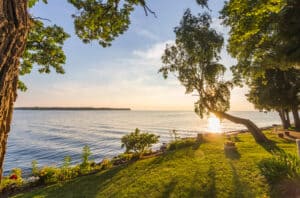Georgia is a unique state for many reasons. Despite not having any national parks, the state is popular for its Seven Natural Wonders. It’s the home of the Georgia Guidestones, a granite monument that some have called “America’s Stonehenge.” It’s the “Peach State,” and it’s celebrated for its many peach orchards. Georgia is also home to a number of natural springs. One interesting thing about Georgia is that it has both cold and warm springs. If you’re looking to visit Georgia or discover more about the state you live in, check out our list of natural springs in Georgia.
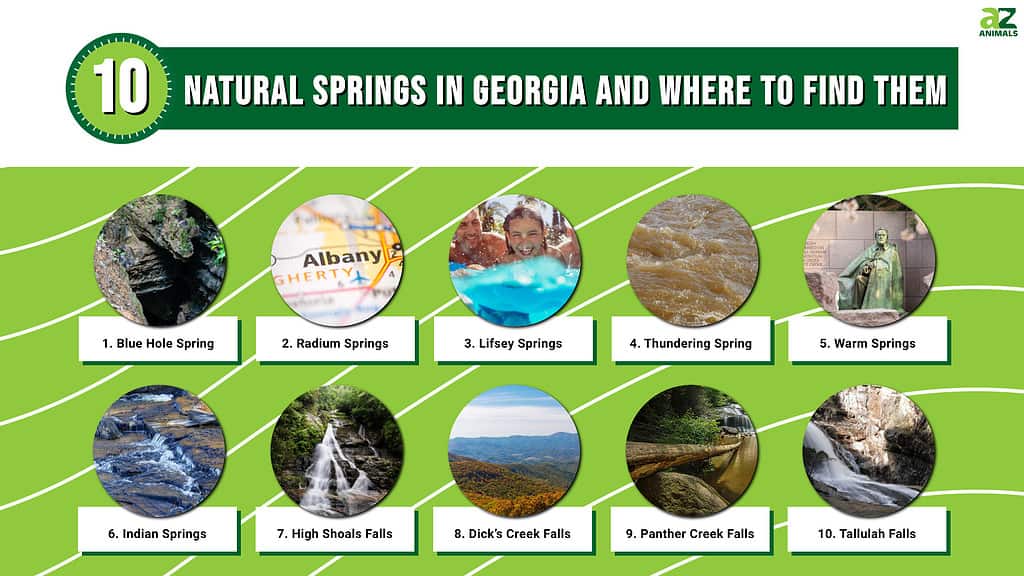
1. Blue Hole Spring
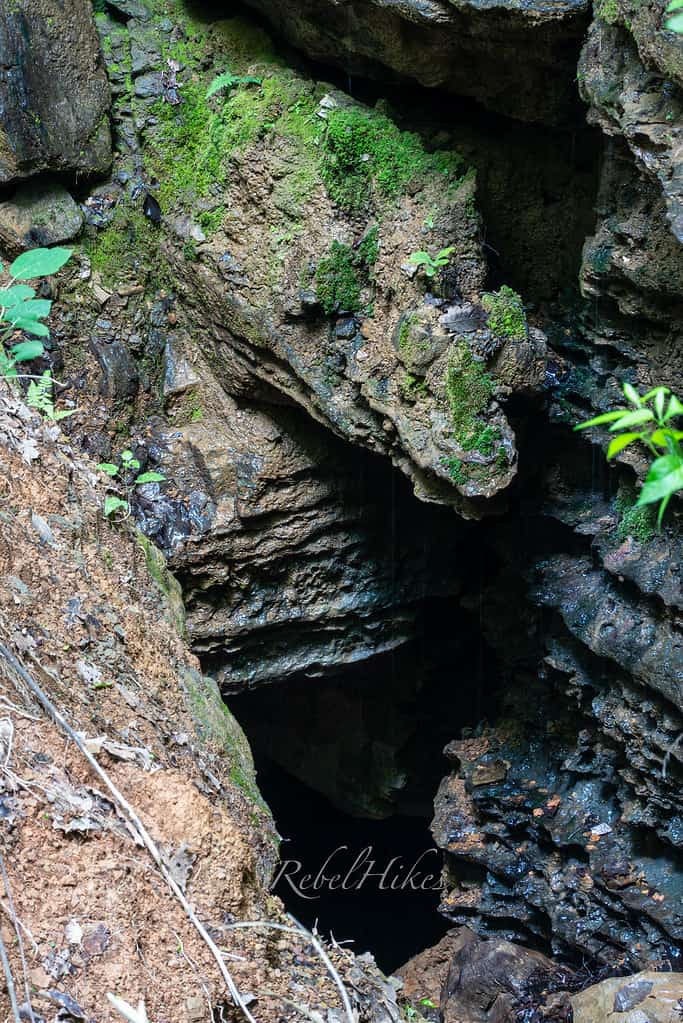
Blue Hole Springs serves as the entrance to the trail to Ellison’s Cave.
©CC BY-SA 4.0 – License
The Blue Hole is an attraction in Walker County. It’s a natural spring, so the water is extremely cold, but it’s also clear, so you can see to the bottom. The Blue Hole is actually the starting point on Blue Hole Trail, a hiking path that leads to Ellison’s Cave. It’s one of the most famous caves in the U.S. That’s because it has the deepest unobstructed underground pitch in the continental U.S. The Blue Hole Trail, which starts at the spring, runs for 2.2 miles in a loop that takes hikers to the Ellison’s Cave entrance.
2. Radium Springs
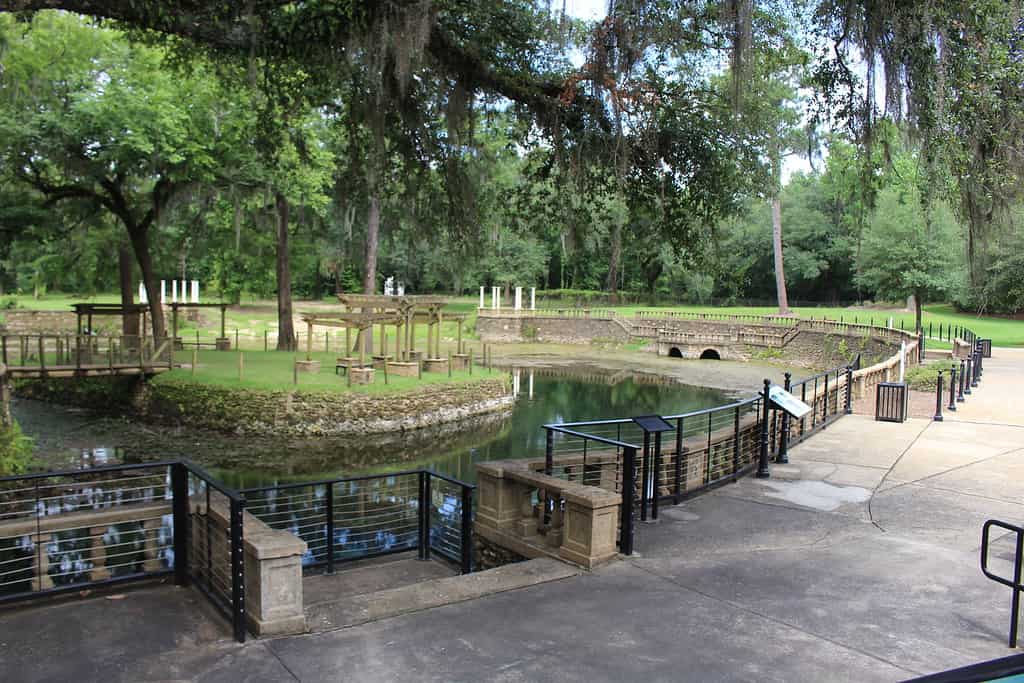
You can find Radium Springs in Albany, GA.
©Michael Rivera / CC BY-SA 4.0 – License
Radium Springs is one of Georgia’s Seven Natural Wonders. It’s a natural spring in Albany that pumps 70,000 gallons of water per minute from an underground cave. The spring is now closed to swimming, diving, and boating, but it’s a beautiful place to visit and view.
Radium Springs gets its name from the discovery of trace amounts of radium molecules in the spring water. This is part of why the spring is now closed. Even though you can’t swim in Radium Springs, you can certainly visit for a day to check out the area. You can view the courtyard where the Radium Springs Casino used to stand and explore the casino garden and gazebos.
3. Lifsey Springs
One of the lesser-known natural springs in Georgia is Lifsey Springs. It’s located about four miles south of Zebulon, and it’s a great place to jump in. The spring was first opened in 1875 as one of the first public swimming pools. It was made into an actual swimming pool that was managed and operated by the Pike County Lions Club from 1960 to 1981.
In 2019, the land was purchased by Ace Amerson, who has been working to clean up and restore the spring to its previous state. He plans to restore the original spring pool house to have a white sand bottom again.
4. Thundering Spring
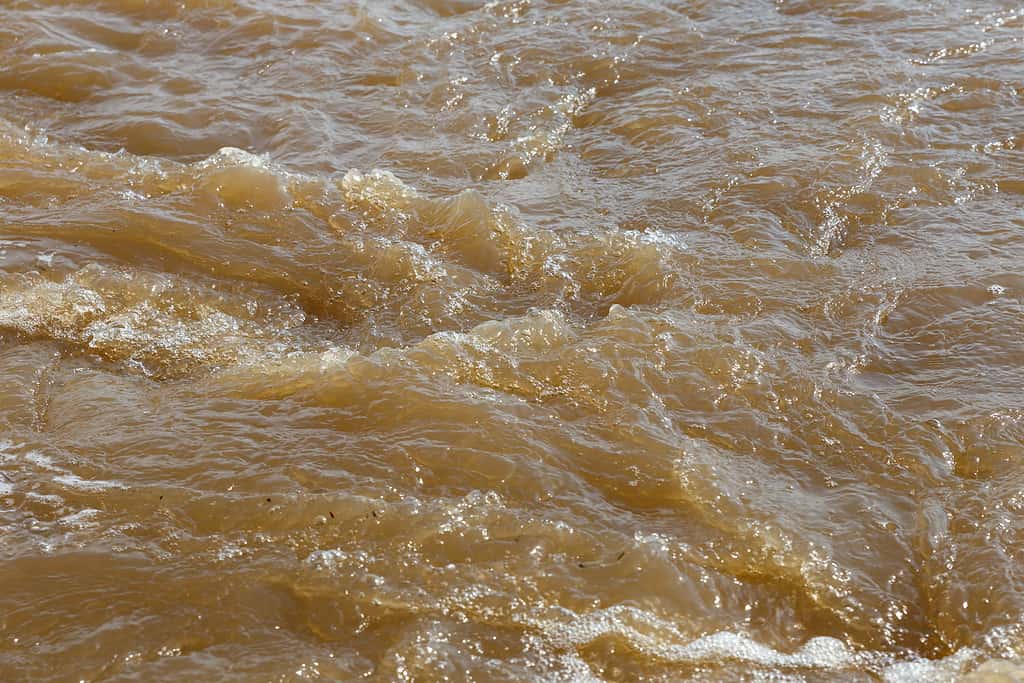
The sound of rushing water at Thundering Spring gives it its name.
©Mieszko9/iStock via Getty Images
Thundering Spring gets its name from the noise it makes, which sounds like a peculiar, thundering sound. It’s located in the city of Molena, and it’s one of the warm springs. The spring is a swamp spring heated in the middle and fed by a small stream. It’s one of the lesser-known springs on our list, and it used to have a wooden structure in it for bathing, but it was worn down.
5. Warm Springs
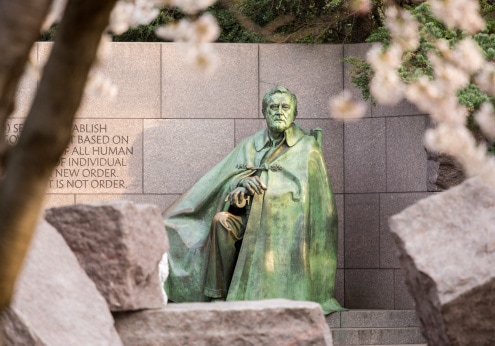
Franklin D. Roosevelt used Warm Springs as the site of his polio treatments.
©BackyardProduction/iStock via Getty Images
Warm Springs is one of the few springs on our list that are not accessible for swimming. The town was made famous by Franklin D. Roosevelt. The former president visited the town for its natural warm springs after suffering from polio. The warm water helped polio victims who needed support to continue exercise again. Roosevelt created the Georgia Warm Springs Foundation in 1927, forming a complete medical community.
You can still visit the warm springs that helped to heal the former president, but you can’t submerge in them. However, there is a project in motion to restore the springs to their former state.
6. Indian Springs
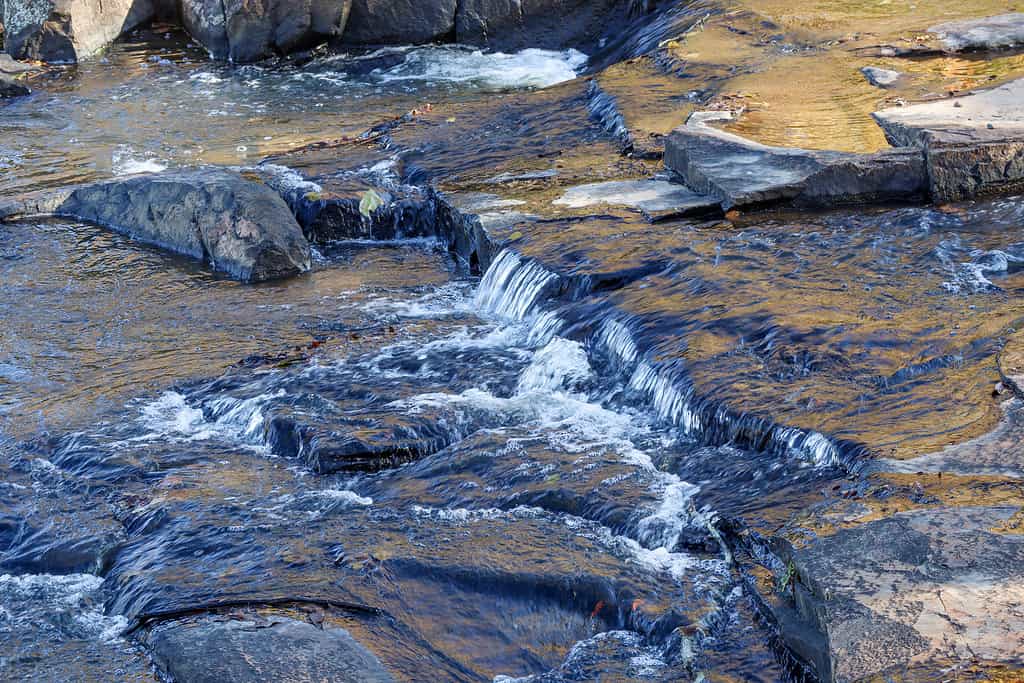
The state park at Indian Springs is one of the nation’s oldest.
©Ed Williams/iStock via Getty Images
Indian Springs is one of Georgia’s state parks and one of the nation’s oldest state parks. Creek Indians used to visit the spring water and collect it for its healing qualities, hence giving the state park its name.
Water still flows from inside the stone Spring House built during the Great Depression. However, visitors can collect the water for drinking; it’s not a spring for submerging or swimming in. You can swim in other parts of the state park, though, including Sandy Creek and McIntosh Lake.
7. High Shoals Falls
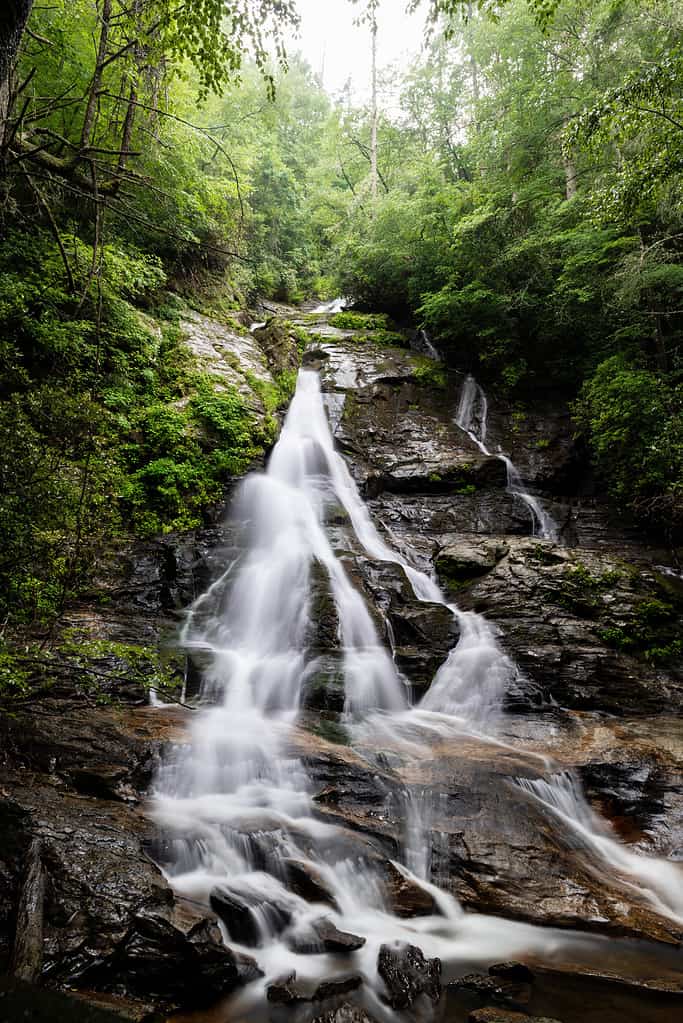
You can find High Shoals Falls in Hiawassee, GA.
©Eifel Kreutz/iStock via Getty Images
High Shoals Falls and Blue Hole Falls (not Blue Hole Spring) are two waterfalls near Helen, GA. A 2.4-mile hiking trail called the High Shoals Falls Trail will take you by both of them. The waterfall is on the Jacob’s Fork River, which is in the South Mountains State Park.
8. Dick’s Creek Falls
Dick’s Creek Falls is near the point where Dicks Creek flows into the Chattooga River. You can follow Sandy Ford Road a few miles from Warwoman Creek Falls to find Dick’s Creek Falls on Dick’s Creek Falls Trail. You can wade in the shoals above the fall, but be careful of slippery rocks.
9. Panther Creek Falls
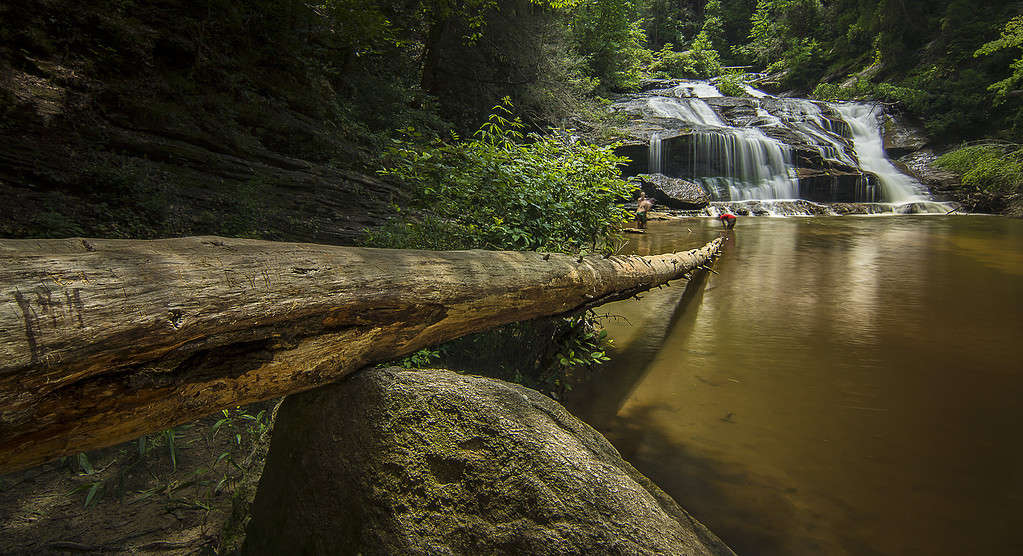
The trail at Panther Creek Falls is not for the beginner hiker, but it’s worth the views.
©Dgrano20/iStock via Getty Images
Panther Creek Falls is also in the Chattahoochee National Forest. You’ll have to take the Panther Creek Falls trail, which is 7 miles through tall trees and beautiful scenery. A sandy flat area below the waterfall is where hikers can sit and enjoy the scenery. The trail is also covered in camping spots, so bring a backpack and camp to truly get the whole experience.
10. Tallulah Falls
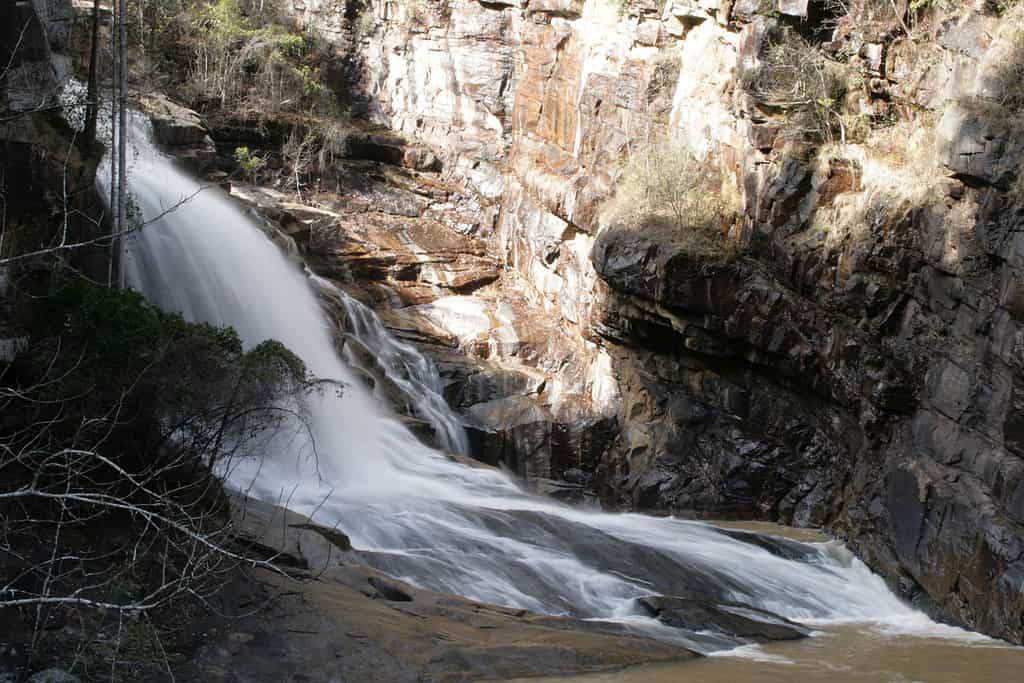
Flowing through Tallulah Gorge State Park are six waterfalls collectively called Tallulah Falls.
©pkphotography/iStock via Getty Images
Tallulah Falls is a series of six waterfalls that flow through Tallulah Gorge. The gorge is 1,000 feet deep and around 2 miles long. The falls are located in the Tallulah Gorge State Park within the town of Tallulah Falls, which is around 2 hours northeast of Atlanta.
The best time to visit Tallulah Falls is during autumn, when the trees around the gorge are changing colors. If you’re interested in getting close to the waterfalls, you can apply to hike the gorge floor. Only 100 people are allowed to do so per day. The park also has two lakes — Lake Yonah and Lake Tugalo — which are popular for bass fishing.
Summary of 10 Natural Springs in Georgia
| # | Spring Name | Location |
|---|---|---|
| 1 | Blue Hole Springs | Walker County |
| 2 | Radium Springs | Albany |
| 3 | Lifsey Springs | Zebulon |
| 4 | Thundering Spring | Molena |
| 5 | Warm Springs | Warm Springs |
| 6 | Indian Springs | Indian Springs State Park |
| 7 | High Shoals Falls | Helen |
| 8 | Dick’s Creek Falls | Chattahoochee National Forest |
| 9 | Panther Falls | Chattahoochee National Forest |
| 10 | Tallulah Falls | Tallulah Falls |
The photo featured at the top of this post is © Ed Williams/iStock via Getty Images
Thank you for reading! Have some feedback for us? Contact the AZ Animals editorial team.



